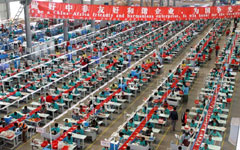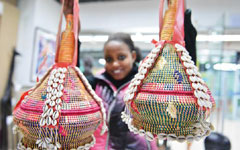Tough times hit footwear manufacturer at first after going abroad
It may turn out to be one of the most inspired decisions Wang Jianping has ever made. Going to Nigeria 10 years ago has helped him turn what was once a modestly sized shoemaker in Wenzhou, Zhejiang province, into a manufacturing phenomenon that has left its footprint all over Africa.
Soon after Wang's Hazan Shoe Co Ltd was founded in 1991 it employed about a dozen people in its small factory, where they made 300 pairs of shoes a day. These days, in addition to its factory and offices in Wenzhou that cover 116,000 square meters, it has four production lines in Lagos employing 1,000 people, making 11,000 shoes a day. It also has a research center in Italy, set up after Hazan bought the Italian shoemaker Wilson in 2008.
But it was going to Africa that radically changed Hazan, which is exactly what Wang had in mind when he planned the move.
|
 |
 |
"Materials and labor are a lot cheaper in Africa than in China, which is why I switched the main factory from Wenzhou to Nigeria, where there is also more demand."
Hazan has now become one of the most popular shoes for males in West Africa. Its sales across the continent brought in revenue of $36 million last year, it says. However, it is not as though the company's African odyssey has been easy.
In January 2004 Hazan was dealt a severe blow when the Nigerian government decided to ban imports of more than 30 products, including shoes. Instead of meekly accepting it as fate, Wang drummed up support among 20 shoe companies in the country to make common cause to get the shoe ban lifted.
"We solved the crisis after long talks with the government. I realized the only way of staying in Africa was to localize," Wang says.
Within nine months he had set up Hazan Asia-Pacific Industrial Co Ltd in Nigeria to make shoes tailored to the local market.
Unlike other Chinese manufacturers that have opened factories overseas and kept their main plants in China, Wang moved Hazan's focus of operations to Nigeria because of the lower costs and a more promising market. He spent more than $6 million to launch a second production line at the factory in 2005.
A year after the factory opened, Hazan advertised 300 vacancies for people who would be given professional training. It brought more advanced plant and machinery from China to Africa.
"Life was incredibly tough when I first went to Nigeria," says Jia Yifeng, operations director of Hazan Asia-Pacific Industrial.
|
 |
 |
